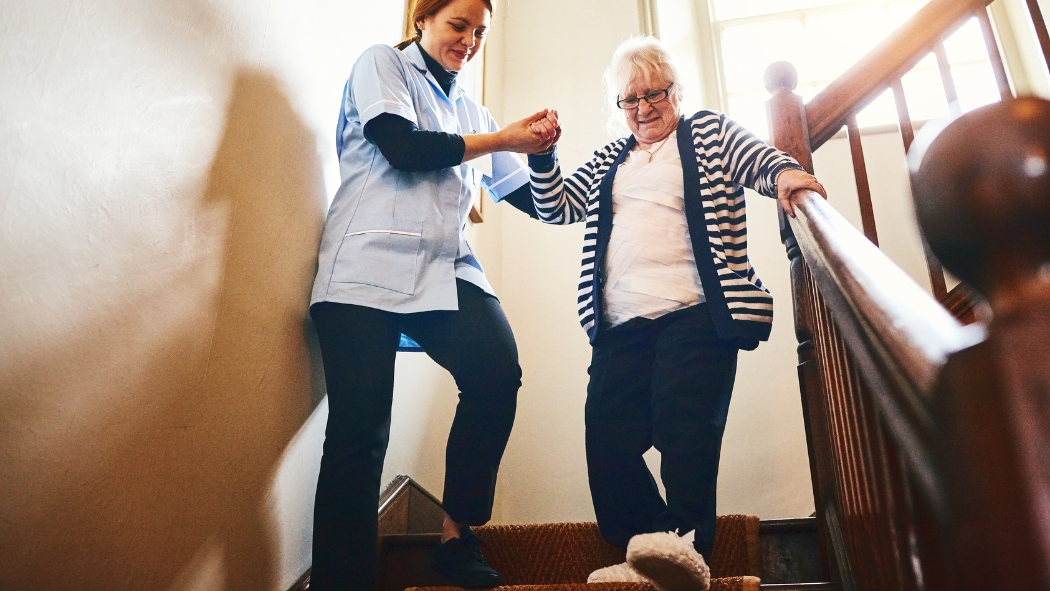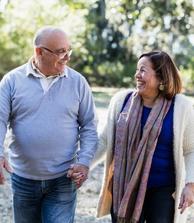With the start of winter, the risk of slips and falls increases, especially for older adults. We sat down with Dr. J.B. Sobel, who serves as chief medical officer for Medicare products at Cigna Healthcare, to talk about his advice on fall prevention.

With winter upon us, the risk of slips and falls increases with every ice and snowstorm. While these conditions can be dangerous for anyone, they can be especially perilous for older adults.
“Older adults are more likely to have balance or vision issues, making them more prone to experiencing a fall, and the consequences are more likely to be severe," said Dr. J.B. Sobel, chief medical officer for Medicare products at Cigna Healthcare.
Even a short walk to get the mail or take out the garbage could result in an unexpected and life-altering fall, Sobel said. In fact, falls are the leading cause of injury and death for people 65 and over in the United States, according to the U.S. Centers for Disease Control and Prevention (CDC). Emergency departments treat 3 million people in that age group each year who seek care after falls for broken bones, head injuries, and other issues.
Fortunately, a little preparation can prevent many falls. Sobel provides the following tips to older adults and their caregivers to help stay safe this winter.
Stay put. When hazardous weather strikes, try to stay home and indoors until conditions improve. If you need food, consider using a grocery or restaurant delivery service. If you need to see a doctor, ask about a virtual appointment – by phone or using video. If you need help, ask family, friends, or neighbors. If you must go out, take it slow and allow plenty of time.
Make walking areas safe. Sprinkle sand or kitty litter on slick surfaces to help improve traction. Use handrails when available. Take shorter steps. If you are a neighbor or a caregiver of an older adult, do a good deed and clear their walkway.
Dress appropriately. Take the weather seriously and dress for the cold and ice or snow, even if you’re stepping outside for just a moment. Wear nonslip shoes or boots or even cleats. If you use a cane, consider adding an ice gripper, which can be found at stores offering durable medical equipment, large retail outlets and home improvement stores.
Think ahead. You don’t want to fall in the snow or ice; if you do, you need to be able to summon help. For that reason, carry a cell phone or other alert device whenever you leave your home. Also, let others know of your whereabouts.
While slips and falls are more common in the winter, they can happen year-round, so it’s important to remain vigilant. This includes fall-proofing your home with equipment such as grab bars inside and outside the bathtub or shower and next to the toilet, and railings on both sides of stairs. Additionally, make sure to tape down any electrical cords on the floor as well as the edges of area rugs. Another way to reduce the risk of falls is with regular strength and balance exercises, which help you stay on your feet and improve flexibility.
Some Medicare Advantage plans, including some plans administered by Cigna Healthcare, offer a falls prevention program at no extra cost to customers. With this kind of program, an expert can help you evaluate your risk and take steps to make you and your home safer. If you have access to a program like this, make sure to take advantage of it.
“By reducing your risk of falls, you help ensure your independence, which helps to improve your overall health and quality of life,” Sobel said.

Fall Prevention – Cigna Healthier Together
Learn more tips on preventing falls year-round.